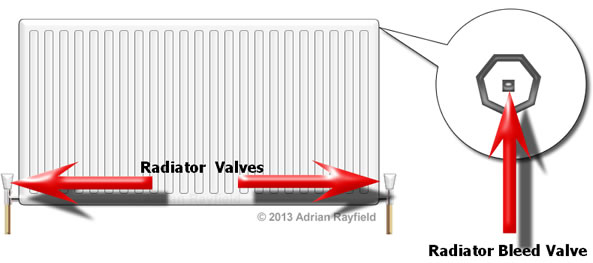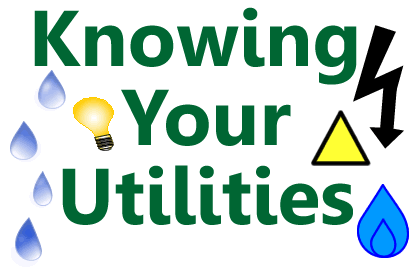Painting, decorating and home improvement tips blog
How to bleed a radiator
Posted by Adrian
February 11th, 2020
How to bleed a radiator
If you have central heating and radiators you will from time to time need to bleed them. This basically means allowing any build up of air out of the system and allow that space to be filled with water.
If you do not bleed the system you will get cold areas within the radiator and the system will not be as efficient and you will not be getting the full heat out of the system.
How can I tell if I need to bleed my radiators
You can tell if you need to bleed your radiators simply by feeling them once they have been on for a while, the radiator will feel cooler at the top than the bottom, mostly the air will be at the top of the radiators, but you may feel cooler spots lower down also. If you find cooler areas more than likely this will be air which doesn’t get as hot as the water so therefore is cooler. If this is what you find, bleed the radiators.

How do I bleed my radiators
This is a quick and easy job, firstly open up all the radiator valves fully, including thermostatic ones, then run the system for around 10 minutes and then turn the system off. You will then need a radiator bleed valve key and a cloth. If you haven’t got a bleed valve key, they can be bought cheaply at a hardware store.
Go around all radiators and open slightly the bleed valve by turning anti-clockwise, this will be located at the top of each radiator and on one edge. Depending on the age of the radiator you may have a small plastic end over the bleed valve, this will direct the water away from the wall. Make sure this is facing away from the wall if not turn it so that it is, you could aim it into a bucket before opening the bleed valve.

Carefully open the valve slightly with the valve key, air should then come out, keep the valve open until water comes out then shut the valve by turning clockwise. Hold the cloth around the bleed valve as you do this to catch any water.
Once you have done this to all radiators you may have to check the pressure of the boiler by looking at the gauge, if the pressure has dropped you may have to ‘top up’ the pressure. This is normally done by opening a tap on the boiler until the correct pressure is reached. To top up the boiler open the tap on the filling Loop, check the boiler handbook to find out how to do this.
If you find that after you have bled the radiators the radiators nearer the boiler are hotter than those furthest away, this means the radiators aren’t balanced and you may have to turn the valves down on the radiators near the boiler and leave the ones furthest away fully open, this will allow the water to reach the furthest away radiators before cooling down.

Top Tip : If the bottom of the radiators are cold, this could be due to a build up of sludge and rust, this needs solving by draining the system down and flushing it all through. If you are unsure call a plumber / heating engineer.
Tags: Bleed, Boiler, Central Heating, DIY, Handyman, heating, Plumbing, Radiator, Valve
Posted in Home Improvements | No Comments »
In an emergency – Knowing your utilities
Posted by Adrian
August 19th, 2019
In an emergency – Knowing your utilities
In an emergency it’s important to know where to find your utilities such as gas, electric and water and know how to turn them off if you need to. It is always good to be prepared and have a plan of action, just in case. Knowing where your utilities are could reduce any further problems or damage to your property.
Water
You should know how to turn off your water supply, to do this you need to know where to find your main stop cock. This may be in the house, your garden, front path or driveway. You may also need a ‘key’ to turn it off as some stop cocks are under a cover, out of your reach, so if you need one of these make sure you know where it is.
Depending on the problem you may be able to isolate the problem locally by turning off an isolator valve, thus leaving the water on to the rest of the house. Isolator valves typically have a slotted screw on them, turn this with a screwdriver a quarter turn, handy to know where you can lay your hands on a screwdriver too. Some valves have a lever, simply turn a quarter of a turn in the direction indicated. Other valves you may have are gate valves, these have a tap looking head on them, turn clockwise to turn of the water.
Labelling which pipe is which and having isolator valves fitted is the best option, turning them off every few months will help keep them in working order and prevent limescale build up that can clog up the valve and make it hard or impossible to shut off.

Electricity
If you have an electrical problem and you need to turn off the power, do you know how to turn yours off? If you need to turn the mains power off you need to do so at the fuse box, or consumer unit as it is called. You should see some fuses and a main switch, turn the main switch off. Most commonly your fuse box will be in a downstairs cupboard or under the stairs. It’s always a good idea to keep a torch handy so you can see what you are doing and if your turning the power off at night you need to see where you are going safely.
If you know what the problem is or you just want to turn part of the power off, say the downstairs sockets because you need to work on them, you can turn that fuse off, or for older fuse boxes remove the fuse.
If you have an older style fuse box, keep some fuse wire beside the fuse box in case one blows, you should never replace fuse wire until the problem that caused it is fixed and never use a higher rated fuse wire than is intended.
Gas
At the first sign of a gas leak you should turn off the mains gas supply to the house. This maybe under the stairs, in the garage or outside in locked utility box. You should never turn on any electrical appliance or switch as a spark could cause an explosion, do not smoke or light a match or use any naked flame, such as a candle. Open windows and doors to ventilate the house then call your emergency number of the gas supplier or the National Gas Emergency service on 0800 111 999.
You should stay out of your property until the gas has disbursed, if the leak is bad enough inform you neighbours and advise them they may need to leave their property to be safe. If you have inhaled a lot of gas you may feel ill, you should seek medical advice straight away.
It is a good idea to have a list of emergency numbers so you know where they are in case of an emergency. Maybe have them on a notice or pin board or on your fridge or freezer.Knowing your utilities and how to turn them of in an emergency
Tags: Consumer Unit, Electricity, Emergency, Fuse, Fuse Box, Gas, Isolator Valve, Meter, Stop Cock, Utilities, Valve, Water
Posted in Home Improvements | No Comments »
